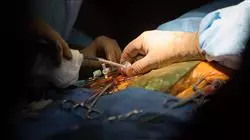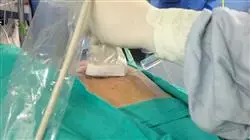University certificate
The world's largest faculty of medicine”
Introduction to the Program
The new scenarios in current Radiology push us to propose new specialization programs that meet the real needs of experienced professionals, so that they can incorporate the advances in Image Guided Medical Intervention"

Medical radiology is of crucial importance in the patient's diagnostic process, but it is increasingly acquiring a leading role in therapeutic interventions that until now have been performed in the dark or by approaching the patient in a much more aggressive way. The latest technological advances that are taking place allow the use of new image-guided systems such as multimodality fusion or the implementation of new therapeutic strategies, such as the administration of drug-loaded particles or oncolytic virus therapy.
This program includes some of the most important areas of interventional radiology, including basic aspects of clinical practice such as management or implementation of the consultation. It addresses processes and areas of knowledge where Image Guided Therapy plays a fundamental role such as neurology, thorax or musculoskeletal. It also includes the main emerging therapies in different areas and the future lines of Image Guided Therapy.
A complete and modern updating program, based on the latest advances in interventional radiology, developed through the latest educational technology, to update the professional and improve patient care.
You will be able to learn, through the latest educational technology, the latest advances in image-guided techniques"
This Postgraduate diploma in Image-Guided Medical Intervention contains the most complete and up-to-date scientific program on the market. The most important features include:
- Clinical cases presented by specialists in Radiology and other specialties
- The graphic, schematic, and practical contents with which they are created, provide scientific and health care training on those medical disciplines that are essential to professional practice
- Real high-resolution images of pathologies, diagnostic imaging tests and guided procedures
- Presentation of practical workshops on procedures and techniques
- An algorithm-based interactive learning system for decision-making in the clinical situations presented throughout the course
- Action protocols with the most important advances in the specialty
- All of this will be complemented by theoretical lessons, questions to the expert, debate forums on controversial topics, and individual reflection assignments
- With a special emphasis on evidence-based medicine and research methodologies in Radiology
- Content that is accessible from any fixed or portable device with an Internet connection
This Postgraduate diploma is the best investment you can make when selecting a refresher program, for two reasons: in addition to updating your knowledge in Image-Guided Medical Intervention you will obtain a qualification from TECH Global University"
The teaching staff includes a team of leading Radiologists who bring their professional experience to this program, in addition to renowned specialists in other medical areas.
The multimedia content developed with the latest educational technology will provide the physician with situated and contextual learning, i.e., a simulated environment that will provide immersive training programmed to train in real situations.
This program is focused on Problem-Based Learning, whereby the Students must try to solve the different professional practice situations that arise during this training. This will be done with the help of an innovative interactive video system created by renowned experts in the field of Radiology with extensive teaching experience.
Incorporate the latest developments in Image-Guided Medical Intervention to your medical practice and improve patient prognosis"

It includes clinical cases and real images in high definition to bring clinical practice as close as possible to the development of the program"
Why study at TECH?
TECH is the world’s largest online university. With an impressive catalog of more than 14,000 university programs available in 11 languages, it is positioned as a leader in employability, with a 99% job placement rate. In addition, it relies on an enormous faculty of more than 6,000 professors of the highest international renown.

Study at the world's largest online university and guarantee your professional success. The future starts at TECH”
The world’s best online university according to FORBES
The prestigious Forbes magazine, specialized in business and finance, has highlighted TECH as “the world's best online university” This is what they have recently stated in an article in their digital edition in which they echo the success story of this institution, “thanks to the academic offer it provides, the selection of its teaching staff, and an innovative learning method aimed at educating the professionals of the future”
A revolutionary study method, a cutting-edge faculty and a practical focus: the key to TECH's success.
The most complete study plans on the university scene
TECH offers the most complete study plans on the university scene, with syllabuses that cover fundamental concepts and, at the same time, the main scientific advances in their specific scientific areas. In addition, these programs are continuously being updated to guarantee students the academic vanguard and the most in-demand professional skills. In this way, the university's qualifications provide its graduates with a significant advantage to propel their careers to success.
TECH offers the most comprehensive and intensive study plans on the current university scene.
A world-class teaching staff
TECH's teaching staff is made up of more than 6,000 professors with the highest international recognition. Professors, researchers and top executives of multinational companies, including Isaiah Covington, performance coach of the Boston Celtics; Magda Romanska, principal investigator at Harvard MetaLAB; Ignacio Wistumba, chairman of the department of translational molecular pathology at MD Anderson Cancer Center; and D.W. Pine, creative director of TIME magazine, among others.
Internationally renowned experts, specialized in different branches of Health, Technology, Communication and Business, form part of the TECH faculty.
A unique learning method
TECH is the first university to use Relearning in all its programs. It is the best online learning methodology, accredited with international teaching quality certifications, provided by prestigious educational agencies. In addition, this disruptive educational model is complemented with the “Case Method”, thereby setting up a unique online teaching strategy. Innovative teaching resources are also implemented, including detailed videos, infographics and interactive summaries.
TECH combines Relearning and the Case Method in all its university programs to guarantee excellent theoretical and practical learning, studying whenever and wherever you want.
The world's largest online university
TECH is the world’s largest online university. We are the largest educational institution, with the best and widest online educational catalog, one hundred percent online and covering the vast majority of areas of knowledge. We offer a large selection of our own degrees and accredited online undergraduate and postgraduate degrees. In total, more than 14,000 university degrees, in eleven different languages, make us the largest educational largest in the world.
TECH has the world's most extensive catalog of academic and official programs, available in more than 11 languages.
Google Premier Partner
The American technology giant has awarded TECH the Google Google Premier Partner badge. This award, which is only available to 3% of the world's companies, highlights the efficient, flexible and tailored experience that this university provides to students. The recognition as a Google Premier Partner not only accredits the maximum rigor, performance and investment in TECH's digital infrastructures, but also places this university as one of the world's leading technology companies.
Google has positioned TECH in the top 3% of the world's most important technology companies by awarding it its Google Premier Partner badge.
The official online university of the NBA
TECH is the official online university of the NBA. Thanks to our agreement with the biggest league in basketball, we offer our students exclusive university programs, as well as a wide variety of educational resources focused on the business of the league and other areas of the sports industry. Each program is made up of a uniquely designed syllabus and features exceptional guest hosts: professionals with a distinguished sports background who will offer their expertise on the most relevant topics.
TECH has been selected by the NBA, the world's top basketball league, as its official online university.
The top-rated university by its students
Students have positioned TECH as the world's top-rated university on the main review websites, with a highest rating of 4.9 out of 5, obtained from more than 1,000 reviews. These results consolidate TECH as the benchmark university institution at an international level, reflecting the excellence and positive impact of its educational model.” reflecting the excellence and positive impact of its educational model.”
TECH is the world’s top-rated university by its students.
Leaders in employability
TECH has managed to become the leading university in employability. 99% of its students obtain jobs in the academic field they have studied, within one year of completing any of the university's programs. A similar number achieve immediate career enhancement. All this thanks to a study methodology that bases its effectiveness on the acquisition of practical skills, which are absolutely necessary for professional development.
99% of TECH graduates find a job within a year of completing their studies.
Postgraduate Diploma in Image-Guided Medical Intervention
Image Guided Medical Intervention is one of the most important areas of modern Medicine. The ability to visualize and guide instruments and devices within the human body with the aid of imaging techniques such as computed tomography, magnetic resonance imaging, and ultrasound has transformed the diagnosis and treatment of various pathologies. Therefore, staying up-to-date in this field is crucial to enjoy a state-of-the-art clinical practice that is completely safe for the patient. The Postgraduate Certificatet in Image-Guided Medical Intervention is a unique opportunity to acquire the most innovative knowledge to perform interventional imaging procedures. The program is designed by experienced and highly qualified specialists in this field, which guarantees quality teaching and is aligned with the latest trends in the sector.
Get up to date in this field of Medicine in just 6 months
The Postgraduate Certificate in Image-Guided Medical Intervention is a fully online program that uses state-of-the-art technology to offer a comprehensive and flexible learning experience. The program focuses on providing knowledge with a theoretical-practical approach, through didactic materials in multimedia formats, among which videos, interactive presentations and analysis of real cases stand out. Through it, you will learn about updated interventional materials, recent advances in diagnostic punctures or cutting-edge ablative techniques. In addition, the program is designed to adapt to your individual needs, offering the possibility to progress at your own pace, respecting your professional obligations and your daily personal tasks without compromising your teaching.







